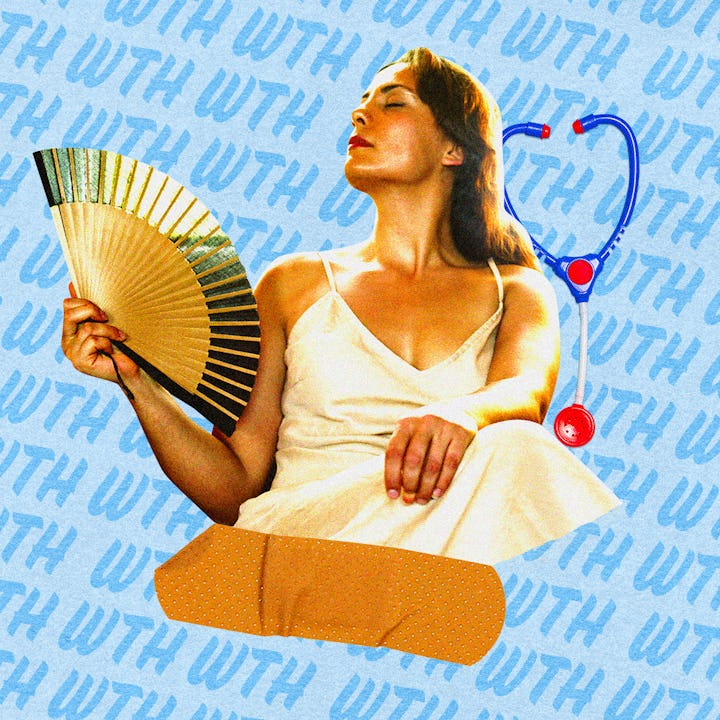The Most Common Age Perimenopause Starts, & What You Can Do To Prepare
Many women don’t know it can begin as early as it does.

WTH?! (What The Health?!) is a Scary Mommy series that will answer health questions relevant to moms and women that we don’t talk about enough. Think: “What is this weird pregnancy symptom? WTF is happening to me postpartum? Are these signs of perimenopause?” Let’s normalize these and other women’s health issues by talking about them more in a relatable, less clinical, and no-BS way.
Skipped periods. Fatigue and trouble sleeping. Mood swings. Breast pain. Sounds like you could be pregnant, right? Welp, think again. These are actually also symptoms of perimenopause, which, because of lack of awareness and education about it, many women don’t expect it to happen as early as it does.
Jancee Dunn, author of Hot and Bothered: What No One Tells You About Menopause and How to Feel Like Yourself Again, was raising her toddler when she first started experiencing symptoms. “[A lot of women] think of it as something that happens way off in the distant future,” she told Scary Mommy. “It can really mess with your head... I could not even conceive of perimenopause.”
If you’re in the middle of parenting, your career, or just life in general and haven’t even thought about (or heard of) perimenopause, you’re not alone. Scary Mommy talked to experts about what perimenopause is exactly, when you’ll most likely start noticing symptoms, and what you can do to prepare for it.
So WTH is perimenopause, and when will you go through it?
Even though all women will experience it at some point, a lot of people don’t even know what “perimenopause” is.
Dr. Michael Krychman, OB/GYN and VP of Medical Affairs at HerMD, describes it as a period of “hormonal chaos” as your body transitions to menopause. “You have one foot in the cycling world and one foot in the menopausal world… It’s this period of normal cycling and abnormal cycling, feeling great and wonderful, and feeling like you're in menopause with hot flashes, vaginal dryness, and other symptoms.”
Krychman says while women may start going through perimenopause earlier or later, symptoms most often occur in your 40s. (The average woman goes into menopause around 51.)
“It's not really a one specific age that you enter in and then it starts. It's kind of a gradual transition,” Krychman says. “It can be anywhere between seven and 10 years before the final menstrual period or before you go into menopause.”
Is there anything you can do to prepare for it?
1. Know your symptoms.
When Dunn first started experiencing perimenopause, she had no idea what was happening to her body. She saw a cardiologist for her racing heart, a dermatologist for her dry skin, and an OB/GYN for her erratic periods. And nobody connected the dots that it was all due to perimenopause. She says if she had known what to expect, she would’ve been able to manage her symptoms more and seek appropriate care.
So what symptoms should you expect? Scary Mommy polled our readers, and these were the most common responses: insomnia, fatigue, body aches, body odor, itchy ears, brain fog, mood swings, heart palpitations, vaginal dryness, night sweats, irregular periods, headaches, random hairs, and rage.
There are at least 34 symptoms of perimenopause and menopause, and they can vary depending on the person. You can read more about the symptoms on the North American Menopause Society’s (NAMS) website.
2. Find a doctor who is trained in menopause.
It’s important to know that not all OB/GYNs have training in menopause. If yours doesn’t, check NAMS to find a certified menopause practitioner in your area.
If you think you have menopausal symptoms, schedule a separate appointment to talk about them. “It’s a big subject and not something to tack on the last five minutes of your pap smear appointment,” Dunn says.
3. Prioritize a healthy lifestyle.
Sometimes it’s easier said than done. But even making small tweaks to your lifestyle habits can make some of these symptoms more manageable or even prevent them, according to NAMS.
A couple tips from Dunn:
- Sleep: Even if it’s as simple as keeping a consistent bedtime or avoiding looking at your phone late at night, find simple ways to improve your sleep habits. It can make all the difference in how you feel day-to-day.
- Exercise: “Be more strategic in ways that you can fit in exercise, even if it's 10 minutes of walking.” Plus, it tends to have a cascade effect and can help with sleeping better and regulating your mood.
4. Talk about perimenopause openly.
Bring it up to people you trust: your friends, your partner, your mom, your doctors.
“Talk about it in an upfront manner without cringing, without whispering it, without making ageist jokes about it,” Dunn says. “I mean, I had to check my own behavior because I realized I was always making Golden Girl jokes about it.”
The more we talk about it in a candid way, the more we can normalize it, know what to expect, and prepare for it. It’s a natural life transition, and there should be no shame in it.
Read our other WTH articles:
What No One Tells You About Peeing After Having Kids
All The Surprising Ways Your Periods Change In Your 40s
This article was originally published on